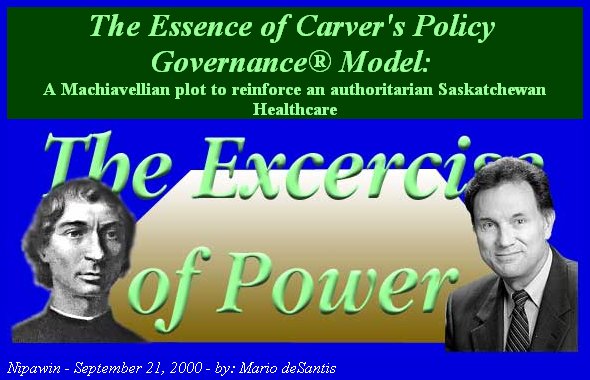Learning Stories
by
Mario deSantis
mariodesantis@hotmail.com
“I am a Canadian, free to speak without fear, free to worship in my own way, free to stand for what I think right, free to oppose what I believe wrong, and free to choose those who shall govern my country.” - -The Rt. Hon. John Diefenbaker, Canadian Bill of Rights, 1960
“The whole judicial system is at issue, it's worth more than one person.”--Serge Kujawa, Saskatchewan Crown Prosecutor, 1991
“The system is not more worth than one person's rights.”--Mario deSantis, 2002
Ensign Stories © Mario deSantis and Ensign
|
|
My first impression of the Carver's Policy Governance® model was the assemblage of directives to assist our elitist bureaucrats to serve themselves at the expense of everybody else(1). I suggest that Dr. Carver would rethink some of his ideas on governance and have a more natural understanding of human nature(2)(3) before he writes again and spreads his Policy Governance® gospel to his congregation of followers, including Brian Rourke(4), the fixed chair of the Saskatchewan Association of Health Organizations (SAHO). Let us see what this Policy Governance® model is about. Dr. Carver states that his
Dr. Carver is absolutely right when he says that his governance model is the world's only complete and universal theory of governance. In fact, in a changing world characterized by continuous learning(6) and infinite choices(7) we find in Dr. Carver's Policy Governance® the only and best source of crafted wisdom to maintain a regressive and authoritarian environment. And you know what this crafted wisdom is, it is the governance by setting policies; so we have a governance by telling, we have a governance by issuing edicts! Where is the due diligence and good faith to serve the members of the organization and have a continuous dialogue with them? I find Dr. Carver's use of the wording 'servant-leader' sacrilegious when I refer to Robert Greenleaf's works on 'servant leadership(8).' Anyhow, in accordance to the Carver's model, the Board is conceived to have only one employee in the Chief Executive Officer, and its main job is to set policies to identify the goals of the organization. These goals set by the Board are called 'ENDS'. The Chief Executive Officer has the power to establish the procedures and methods to satisfy the ENDS set by the Board, and these procedures and methods are called 'MEANS.' Therefore, the role of the Board and the role of the Chief Executive Officer are clearly identified and they are not overlapping, one role is called governance and the other is called management (or administration). The Board takes care of the ENDS and the Chief Executive Officer takes care of the MEANS. In particular, the Chief Executive Officer has the power to choose any procedures or methods unless told otherwise by the Board. The exclusive exercise of governance by the Board, and the exclusive exercise of management by the Chief Executive Officer are artificial and dysfunctional activities. In fact, you cannot have a sense of community, or a sense of bonding, or a sense of partnership unless a dialogue is entertained among the Board, the Chief Executive Officer, the staff, the members and all the other stakeholders. Therefore, the compartmentalization of the functions of the Board and of the Chief Executive Officer create nightmares for all the stakeholders of the organization. As consequence, the Board's essential monitoring function to ensure that the MEANS satisfy the ENDS provide an overall environment of distrust and a further escalation of new ENDS, more Machiavellian MEANS and more nightmares. Lorna Cosper, former Board Chair of the Prairie West District Health, has properly highlighted the tyrannical philosophy of the Carver's Policy Governance® model when in addressing her Board she said: "we have the right to monitor any policy by any method and at any time the Board chooses over and above regular monitoring(9)." And it becomes apparent, that under the authoritarian Policy Governance® model, people cannot grow, people cannot feel freer, people cannot become healthier, people cannot become more autonomous. Let us hope we can wake up from the nightmares caused by this Machiavellian plot of our incompetent leaders, throw away this Policy Governance® model and embrace new administrative philosophies(10) where learning(11) and knowledge(12) are the common denominators for the Board, for the Chief Executive Officer, for the staff , for the members, and for all the stakeholders, that is all of us people. Endnotes 1. A first impression of the Carver's Policy Governance® Model, by Mario deSantis, September 18, 2000 http://www.ftlcomm.com/ensign/desantisArticles/2000_200/desantis229/Carver.html 2. What it is to be human, by Humberto Maturana http://www.pnc.com.au/~lfell/notes.html 3. The contributions of Humberto Maturana to the sciences of complexity and psychology, Alfredo B. Ruiz, Instituto de Terapia Cognitiva, Santiago, Chile http://www.inteco.cl/contrib/contrib.txt 4. Brian Rourke wants more healthcare money: 40% of public expenditures are not enough, by Mario deSantis, November 14, 1999 http://www.ftlcomm.com/ensign/desantisArticles/desantis83/Rourke_Nov14-99.html 5. Policy Governance® Defined, by Dr. John Carver, http://www.carvergovernance.com/model.htm 6. Learning Organizations, http://www-bus.colorado.edu/faculty/larsen/learnorg.html 7. The Simplicity Manifesto, by Bill Jensen http://www.simplerwork.com/manifesto.htm 8. The Robert K. Greenleaf Center for Servant-Leadership http://greenleaf.org/index.html 9. Chairperson's Report: Prairie West District Health, by Lorna Cosper, March 6, 1996, Kindersley, Saskatchewan. The Prairie West District Health uses the Policy Governance® model. 10. MANAGEMENT GENERAL, site managed by Tom Brown, http://www.mgeneral.com/index.html 11. THE PETER F. DRUCKER FOUNDATION FOR NONPROFIT MANAGEMENT http://www.pfdf.org/ 12. @brint.com: The BizTech Networktm, site founded by Dr. Yogesh Malhotra http://www.brint.com/ |
